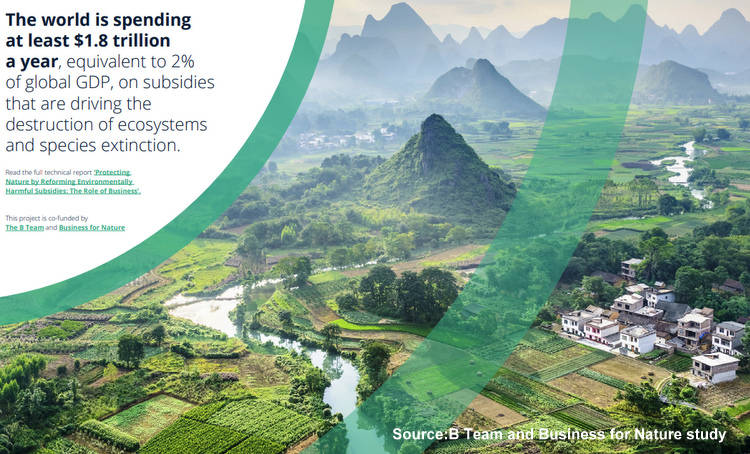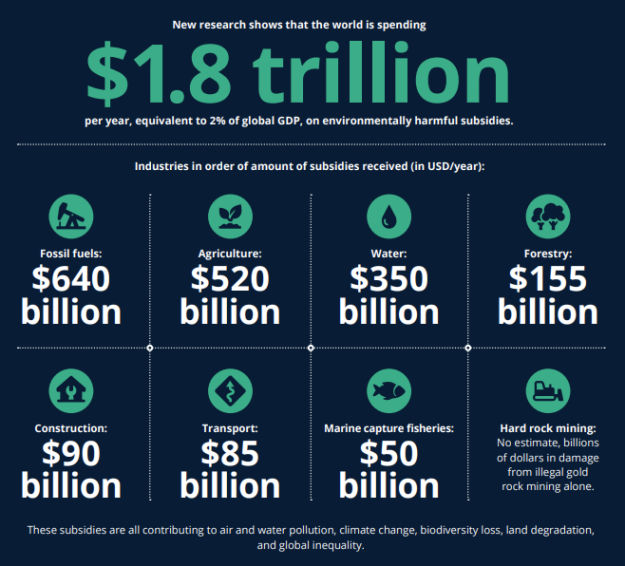“The world is spending over $1.8 trillion a year, equivalent to 2% of global GDP, on subsidies that are driving the destruction of ecosystems and species extinction,” finds a recent study commissioned by Business for Nature and The B Team. The authors of the study are Doug Koplow and Ronald Steenblik.

(This article is sourced from the Financing Our Survival report, the media release and the Business for Nature website.)
Financing Our Own Extinction
The study provides an estimate of the total value of environmentally harmful subsidies (EHS) across key sectors. It finds the fossil fuel, agriculture and water industries receive more than 80% of all environmentally harmful subsidies per year, depleting natural resources, degrading global ecosystems, and perpetuating unsustainable levels of production and consumption, in addition to exacerbating global inequalities said the media release.
What are EHSs?
“Environmentally harmful subsidies (EHS) are government programs that encourage unsustainable production or consumption, and in doing so harm nature by exhausting natural resources, degrading global ecosystems, and damaging planetary health. These subsidies were established with good intent: to promote economic access and solve social issues such as food security, or improve access to energy and clean drinking water. However, often the intended social goal of subsidies has been pursued without consideration of their environmental impacts. This siloed approach has contributed to the many crises afflicting the natural world, placing livelihoods and economies at risk.”
Impact of these subsidies
“The World Economic Forum ranks climate action failure, extreme weather and biodiversity loss as the top three threats facing humanity, fuelled in part by the large scale of public money flowing to harmful industries and practices.” The result is that:
- subsidies are contributing to major global challenges including climate change, nature loss and social inequalities;
- nature is declining globally at unprecedented rates and a massive reduction in harmful subsidies is necessary to reverse the catastrophic loss of species.
Breakdown of EHS across the economy
The study provides an estimate of the total value of environmentally harmful subsidies (EHS) across key sectors.
- $640 billion of support a year is received by the fossil fuel industry, contributing to climate change, air and water pollution, and land subsidence.
- $520 billion of subsidies a year finances the agriculture industry. The environmental damage of unsustainable agricultural activities includes soil erosion, water pollution, commodity driven deforestation, greenhouse gas emissions, conversion of natural habitats and consequent biodiversity loss.
- $350 billion a year flows to the unsustainable use of freshwater and the management of water and wastewater infrastructure, contributing to water pollution and risks to ecosystems in waterways and the ocean.

Benefits of redirecting harmful subsidies
The benefits of eliminating and redirecting harmful subsidies are many:
- Free up substantial government resources to support social needs and local livelihoods.
- Redirect capital towards ecological restoration, including nature-based solutions.
- Close the biodiversity finance gap by reducing environmental degradation and unlocking the funding needed to mitigate it.
- Send more accurate signals to public and private investors and producers on where to direct R&D efforts and future investments.
- Accelerate innovation to reduce greenhouse gases and environmental damage.
- Create a level playing field for businesses, which would further encourage rapid transformation of business models.
- Unlock social benefits such as poverty reduction, improvements in education and other social services, and more sustainable approaches to providing basic access to energy, clean air and water.
“This report is critically important. Transformative action on incentives and subsidies harmful for biodiversity will be decisive this decade to bend the curve of biodiversity loss. I strongly believe this timely report will help generate the requisite political momentum and contribute to the global biodiversity framework.” — Elizabeth Mrema, Executive Secretary, Convention on Biological Diversity
Harmful subsidies must be redirected towards protecting the climate and nature, rather than financing our own extinction. — Christiana Figueres, Former Executive Secretary of the UNFCCC; Member, The B Team
ICYMI:
Why Are Canadian Banks and Insurance Companies Still Financing Russian Oil
Unless We End Financing of Coal, It Will End Us
Frankie the Dinosaur Says Listen Up People: Don’t Choose Extinction
This work is licensed under a Creative Commons Attribution-NonCommercial 4.0 International License.




















Great article! I absolutely agree!
For further documentation see “Cost of Fossil Fuel Subsidies” with over 80 references at https://www.newprogs.org/cost_of_fossil_fuel_subsidies
Great addition to the article with that link Ed. – Thanks
[…] From Below 2C: “The world is spending over $1.8 trillion a year, equivalent to 2% of global GDP, on subsidies that are driving the destruction of ecosystems and species extinction,” finds a recent study commissioned by Business for Nature and The B Team. “Harmful subsidies must be redirected towards protecting the climate and nature, rather than financing our own extinction.” — Christiana Figueres, Former Executive Secretary of the UNFCCC; Member, The B Team. Read more. […]
[…] am aware of the practical challenges we face today, such as water scarcity, food security, and energy production. Solving these issues is crucial for sustainable growth. Fortunately, […]